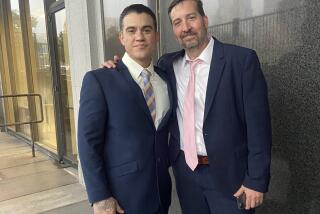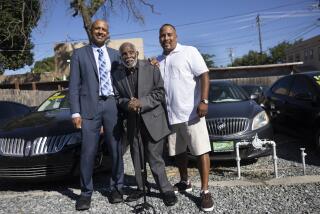D.A. won’t retry man held 22 years in Venice slaying
- Share via
Upon learning that he was truly a free man, Timothy Atkins bore the stoic attitude that helped him survive the 22 years he spent in prison before a judge threw out his murder conviction this year.
Prosecutors said Friday they would not retry his case, and Atkins walked into the gray morning, expressing neither glee at his exoneration nor anger at the lost years.
“I just want to move forward, there’s nothing to look back for,” said Atkins, 39.
Atkins, who has maintained his innocence since he was convicted in 1987 of second-degree murder and two counts of robbery, said he was “going to go home, kick back and play some PlayStation.”
Prosecutors insist he was guilty of taking part in a carjacking attempt on New Year’s Day 1985, in which florist Vincente Gonzales was shot to death in Venice. But when Superior Court Judge Michael Tynan threw out the conviction in February after the key witness against Atkins said she lied, prosecutors didn’t have enough evidence to go forward.
“We believe the right person was tried and convicted,” said Deputy Dist. Atty. Scott Collins.
Atkins’ attorney, Justin Brooks, called the allegation outrageous and said prosecutors’ inability to admit what went wrong at Atkins’ trial will ensure innocent people will continue to be put away.
“When a plane crashes, we do an investigation of why the plane crashed,” he said. “We need to do that with the justice system.... It does no good for anyone if, after these cases, we just say, ‘Oh, well, let’s move on.’ ”
Atkins was a 17-year-old gang member in Venice when Gonzales was killed. He and his friend, Ricky Evans, were arrested after an acquaintance, Denise Powell, told police that Atkins bragged about the killing one night when the three were driving around looking for crack cocaine. Atkins, she told them, said he had “offed” the man.
Evans was killed in jail before he could go to trial. Atkins barely survived the same assault.
Powell could not be located for his trial, but her preliminary hearing testimony, in which Atkins’ attorney barely cross-examined her, was read to the jury.
After his conviction, Atkins said he heard that Powell had approached his family and admitted that she lied about him and was sorry.
But he didn’t have the money for a lawyer to pursue it and Powell -- frequently homeless and in and out of jail -- was hard to find.
In 2001, he sent a letter laying out his case to the California Innocence Project at California Western Law School in San Diego. The pro bono clinic took up his cause, but could not locate Powell until February 2005 -- at a rehab clinic in El Monte.
Law student Wendy Koen got a video declaration and signed statement from Powell, and at a hearing Powell testified that she had lied under pressure from police.
The district attorney argued that the recantation was dubious and that corroborating evidence supported her original testimony.
On Feb. 9, Tynan ruled that Powell’s turnabout was credible and fatally undermined the prosecution’s case. He noted that the victim’s wife, who was splattered by her husband’s blood during the shooting, caught only a one-second glimpse of a suspect whom she described as 5 feet 4 -- whereas Atkins is 6 feet tall. He found her subsequent identification of Atkins in a photo lineup “highly questionable, if not totally unreliable.”
Tynan ordered Atkins released and gave the district attorney 60 days to decide whether to retry the case or drop the charges.
The district attorney gave no indication of his intention until Friday’s deadline.
“Based on the state of the evidence in 2007 and the trial court’s ruling on the habeas petition, we are no longer able to proceed on this matter,” Collins said.
Tynan dismissed the case.
Atkins hugged his attorneys and told the judge he planned to take a job doing gang intervention in Venice; he said he dropped out of his gang in 1992. “Mr. Atkins, I wish you the best of luck,” Tynan said.
Atkins didn’t expect an apology, but he was firm about his innocence.
“The system was wrong. I did [more than two decades] for it.”
*
More to Read
Sign up for Essential California
The most important California stories and recommendations in your inbox every morning.
You may occasionally receive promotional content from the Los Angeles Times.














